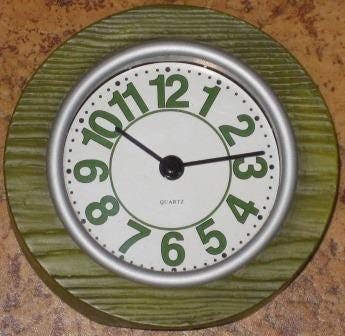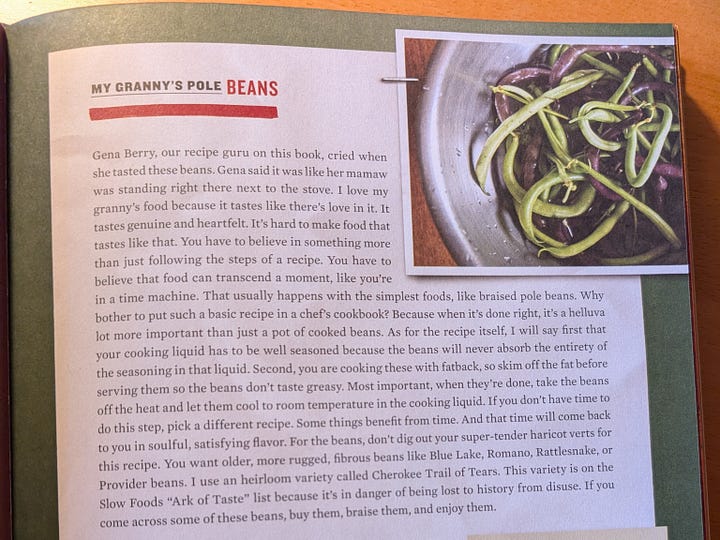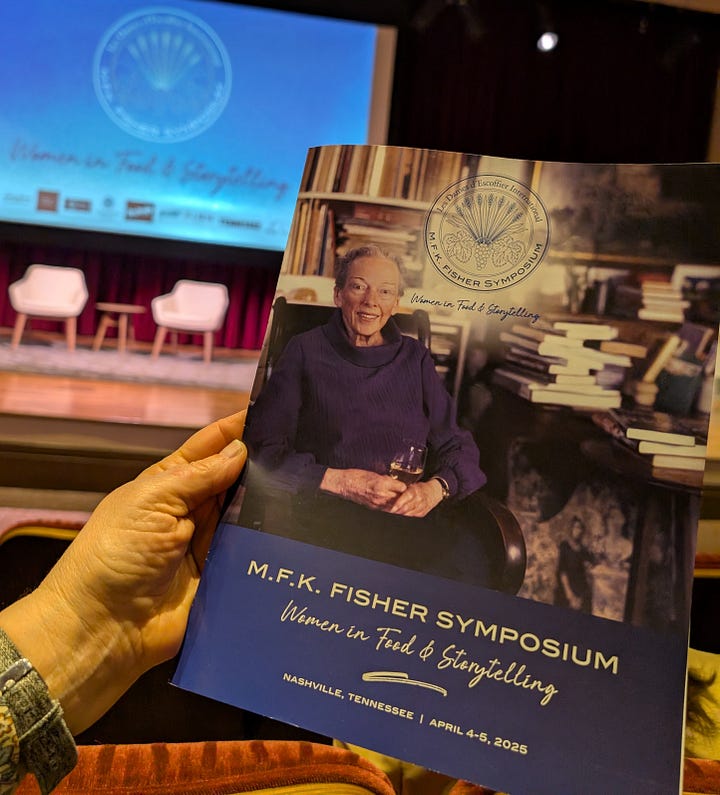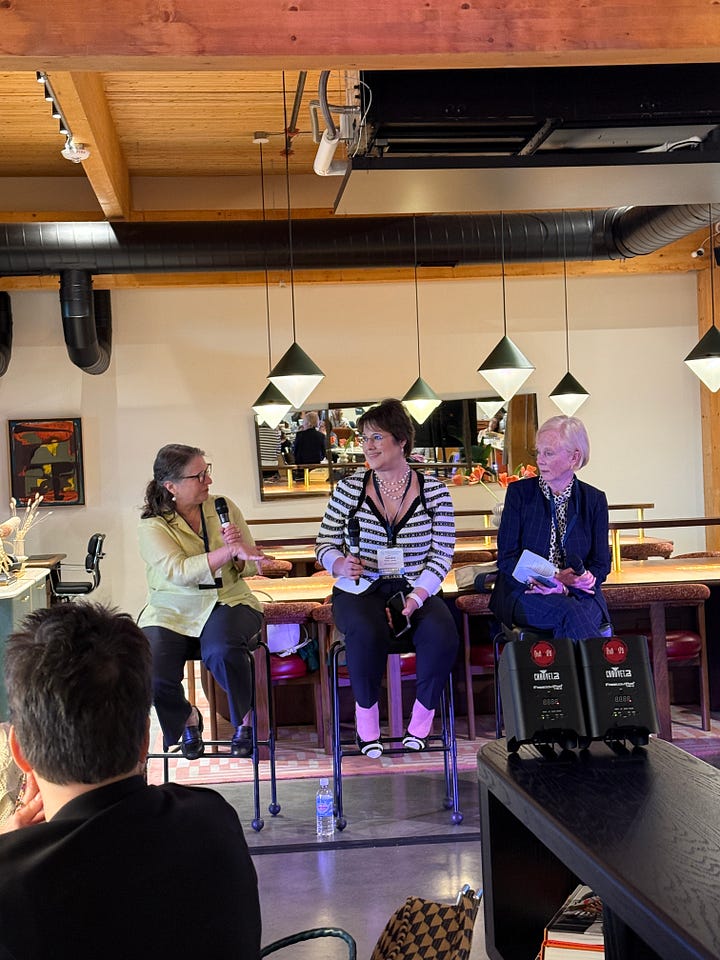Granny’s Beans and the Power of Time
Discovering a missing puzzle piece and a celebration of stories, recipes and food writing
“If you don’t have time to do this step, pick a different recipe.”
Such is a dose of advice that chef Kevin Gillespie shares in the headnote for My Granny’s Pole Beans in his 2012 cookbook Fire in My Belly: Real Cooking. It’s the kind of wisdom for us to pick up from careful attention to how our loved ones cook our favorite, cherished dishes. A vivid example of how important it is to go beyond just the basics of an ingredient list and general description of preparation method—watch them cook, notice the unspoken parts of the process, pay attention to the littlest of details.
I wouldn’t have known to pull out my copy of that cookbook and turn to that recipe page a few days ago if I hadn’t recently run into Gena Berry, a friend and colleague I saw in Nashville last weekend. Gena is a multi-talented food stylist, event producer, all-around culinary professional from Atlanta. We were both at the inaugural M.F.K. Fisher Symposium: Women in Food & Storytelling hosted by the Nashville chapter of Les Dames d’Escoffier International (of which I’m a member in the Seattle chapter).
Sunday morning, Gena joined me for a spell in the hotel breakfast room to catch up, as the bustle of the previous couple of days hadn’t allowed us to do so yet. She’d soon be back on the road heading home to Atlanta, I’d be exploring the city a bit that afternoon before a later flight home. What a treat it was to have some unstructured time that morning to just hang out and unwind a bit after the high-energy engagement and near overload of inspirations from the symposium.
When I got around to telling her about this Long Live the Recipe Box project, as so often happens, she had a story to share that immediately came to mind. And it was about those beans.
In trying over recent years to recreate her own grandmother’s version of green beans, she’d been frustrated about never getting it quite right. She felt pretty sure she was starting with the right ingredients, and she did her best to piece together the steps her grandmother would have gone through. Her attempts tasted good, but something was missing.
It wasn’t until working with Kevin Gillespie on recipes for that cookbook project that she discovered the missing puzzle piece. As he wrote, “Gena Berry, our recipe guru on this book, cried when she tasted these beans. Gena said it was like her mamaw was standing right there next to the stove.”


The missing piece was time. Here’s how Kevin Gillespie explained it: “Most important, when they’re done, take the beans off the heat and let them cool to room temperature in the cooking liquid. If you don’t have time to do this step, pick a different recipe. Some things benefit from time. And that time will come back to you in soulful, satisfying flavor.” That’s exactly what Gena tasted in the kitchen with the chef while working on that book—the flavor of her grandmother’s beans from so many years ago.
And I love how, in that same headnote, he expresses one of the most profound things about preserving these recipes we cherish, recipes that provide rich connection:
“I love my granny’s food because it tastes like there’s love in it. It tastes genuine and heartfelt. It’s hard to make food that tastes like that. You have to believe in something more than just following the steps of a recipe. You have to believe that food can transcend a moment, like you’re in a time machine.”
So here’s to a celebration of time. The time we devote to gathering and chronicling beloved recipes. The time to cook with loved ones so we can pick up every nuance of their skill and insights when they make our favorite recipes. The time to sit and chat and get all the stories that go with those recipes. And the time to let those beans sit to soak up all the flavor that ensures they’ll transcend time for years to come.
Recipes and Storytelling
It was a joy to be able to attend that symposium in Nashville for a whole lot of reasons. For starters is the fact that it celebrated one of the most revered food writers of the past century, M.F.K. Fisher. I have a copy of her The Art of Eating—a compilation of five of her earlier books—that I dated 1985 on the inside cover. I’ve been a fan of her work predating my own food writing career. A highlight of our time in Nashville was a screening of the documentary of her life, I treasured being able to learn more about her experiences and contributions.
To also be among the speakers at the symposium was an extraordinary honor. I moderated a panel Storytelling Through Recipes with two outstanding, inspiring writers: Anne Byrn and Sandra Gutierrez. If you have any interest in food and stories, you should definitely subscribe to Anne’s Between the Layers. A post from last month featuring Lemon Poppy Seed Cake was among the examples she shared on that panel, a powerful thought from which is “Home baking can’t heal the mess we’re in right now. But the beauty of recipes, especially poignant ones like this cake, is how they transport you back a few years or maybe a world away from where you are now.” Another reference to time and recipes’ capacity to connect us with our past.
I wish I could recount here all the wisdom shared by those two during our panel conversation. I’ll nudge you to have a look at a couple of their cookbooks that so beautifully reflect their commitment to telling compelling stories through individual recipes and the collection as a whole. For Anne, Baking in the American South and American Cake. And for Sandra, Latinísimo and Latin American Street Food.


Reflective of the journalism background each has, Anne and Sandra focus more on sharing the recipes and stories of others than those of their own family. The craft of their storytelling, the quality of curiosity that comes through in what they share, the degree of detail they get from their sources about the recipes themselves as well as the meaning and value they hold—we can all echo that approach with our personal projects, large or small, related to cherished recipes we want to collect and preserve.
Another aspect of their work that Anne and Sandra have in common is their intent to seek out people and stories that might not otherwise be shared with a broader audience. That approach not only benefits the reader who has access to insights and perspectives they might not otherwise read, it also lifts up and honors the breadth of individuals out there with stories waiting to be told.
Bringing this back to our beloved recipe collections: something I share in workshops is the unexpected value there can be in us simply asking for a recipe with which we feel a connection. Especially when those requests go beyond the more obvious channels of recipe lineage—our parents and grandparents. When you reach out to your cousin, neighbor, colleague, former teacher, classmate, whoever it might be, you’re acknowledging that something they’ve cooked holds meaning for you. The delight it may bring them, the chance for a story to be shared that’s just been waiting to be told…it can make seeking out recipes a rich experience for all involved.
P.S. I apologize for the lack of a newsletter last week—best intentions clashed with a comically bad travel day-and-a-half getting to Nashville (partly, but not completely, due to terrible weather). And this week’s is getting to you quite late. I will do my best to make it up to you with an extra newsletter or two in the coming weeks!




I have to admit, I googled the event, not knowing about it until now, and found so many topics I would have loved to hear in person. I'm so glad you're sharing all of it with this :)
"You have to believe in something more than just following the steps of a recipe. You have to believe that food can transcend a moment, like you’re in a time machine."
— This is such a lovely sentiment.
That symposium sounds fantastic! I've been participating in my city's annual bookstore crawl (a month-long event for local indie bookshops) and I was so pleased to find a copy of M.F.K. Fisher's "How to Cook a Wolf" at a new-to-me shop this past weekend, which somehow feels particularly timely.